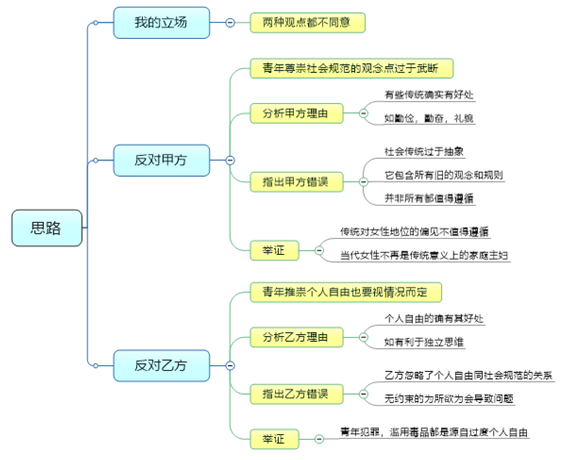双边类大作文,社会类话题
Some people think that young people should follow the traditions of society. Others think young people are free to behave as individuals. Discuss both views and give your own opinion.
题目来源:2020年12月3日大陆雅思大作文(重复2012年2月4日大陆题目)
题目大意
有人说青年应该遵循社会传统,也有人说青年应该推崇个性自由。双边讨论并给出你的观点。
思路解析
这是一道社会类话题的考题,因为题目比较抽象,所以很多同学都会觉得有点难写。不过好消息是,同类型讨论“社会传统要不要遵循”的题目,08年以来应该只考过5次(算上这一题)。虽然频率很低,但既然遇到了,我们就来一起看下究竟应该怎么写这道题。
题目本身是双边讨论类的大作文,同学可以自由讨论两边的观点利弊并给出自己看法。但这道题目中“the traditions of society” 和 “young people are free to behave as individuals” 两个部分都过于笼统了。传统习俗中有好有坏,个性自由同样如此。我们都听过“取其精华去其糟粕”的观点,因此我们建议文章可以持中立态度,两边都不赞同,并且分别进行分析。
社会传统有很多,好的部分,大家可以记住八个字:“孝悌忠信礼义廉耻”。(别告诉月半鸭那么读那么多年书你没听过这八个字)
当然,你写大作文不用把上面8个字解释挨个写上(具体解释大家也可以自行百度~),但我们可以总结下,社会传统对年轻人会有四个方面好处。
一是鼓励年轻人孝敬父母长辈,鼓励家庭关系和睦、家庭成员之间深入沟通及互相帮助,加深年轻人对家庭的感情维系,并且这有助于年轻人自身健康的心理成长。
二是希望年轻人提高自身的道德修养,礼貌待人并且勇于帮助他人,这能让年轻人更好地去和他人合作,也有助于让年轻人获得一个更好地社交环境。
三是教导年轻人要信守诺言,对于负责的工作和任务必须要认真完成,这对于年轻人将来的职业发展也会有帮助。
四是要求年轻人遵守规则和法律要求,不能去侵害他人利益或者做违法行为,这也有助于降低青少年犯罪的可能性。
但是,社会传统中也有问题,比如以前女性的社会地位低下得不到应有尊重,以及要求孩子完全听从家长的安排,两者都没有独立的人生选择权力,包括教育、爱情、事业都受到限制。因此,这些传统不应该继续被遵循。
再来看个性自由,这个同学们应该很容易想到。好处主要有两方面。
一是年轻人有自己的权力选择自己想做些什么和过什么样的生活。而且现代社会的选择是非常多样的,年轻人可以根据自己的喜好、擅长来决定自己做什么。这样的个性的选择也更有助于年轻人发挥潜力获得更好的成果。
二是通过让年轻人自由发挥,将更有助于培养思维能力、创造力和积极性,当遇到问题时,他们也可能会找到更具创造性和效率的方式来解决问题,而不是一味遵循以前的方式。
但是完全推崇个性自由坏处在于,如果不加以约束,可能会导致年轻人往坏的方向发展,年轻人可能会去吸毒、从事犯罪等违法行为。对自己和社会都造成危害。
提纲
范文示例
Some people claim that youngsters should learn to be a social member restricted by traditional etiquette, while others consider it better for them to be independent individual as they wish. Personally speaking, neither of the two opinions is to justified enough to represent the entire picture.
On the one hand, it doesn’t make sense to oblige young minds to stick to traditions without substantiating what specific principles to follow. Indeed, some traditional virtues do contribute to the cultivation of moral convictions among younger generations, whether these be the respect for others, hardworking spirit, or frugality. Nevertheless, the problem with the statement is the ambiguous descriptor ‘the traditions of the society’, which is an overarching concept that incorporates all rules embraced by older generations – while some still deserve a place today, others may be incompatible with the whitewater world of constant change. One concept that fails to meet the modern trend of thought is the entrenched stereotype of women, whose role has transformed from housewives locked to kitchens to business elites in offices as their male counterparts.
By the same token, it is also generalized to venerate the individualism without taking into account contexts. The devotees of personal freedom may point to its value in the establishment of qualities such as self-reliance or critical thinking ability; both are imperative in cultivating independent young minds. However, those thinking in this way are oblivious to the underlying interplay between individual liberty and social order – the appropriateness of encouraging individualism should be subject to the social impacts desired in the local context and what is valued by local stakeholders. Let’s not forget that many social conundrums are attributed to the unrestricted behaviors of youngsters, such as drug abuse, juvenile delinquency, etc.
From what has been discussed, it is my conclusion therefore, neither social traditions nor individualism should be venerated as the only model of society; which view deserves more attention should be contextualized.


